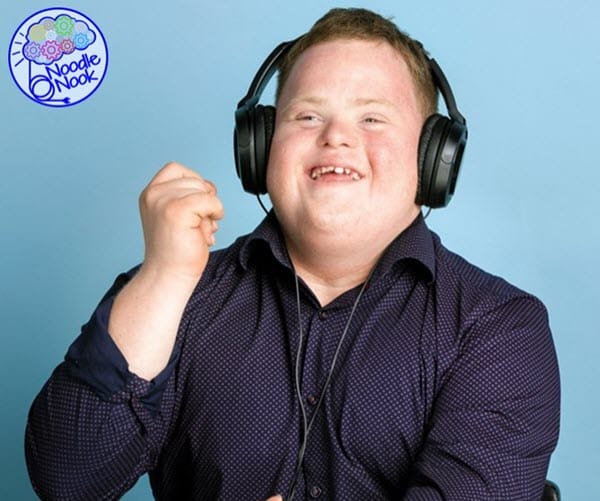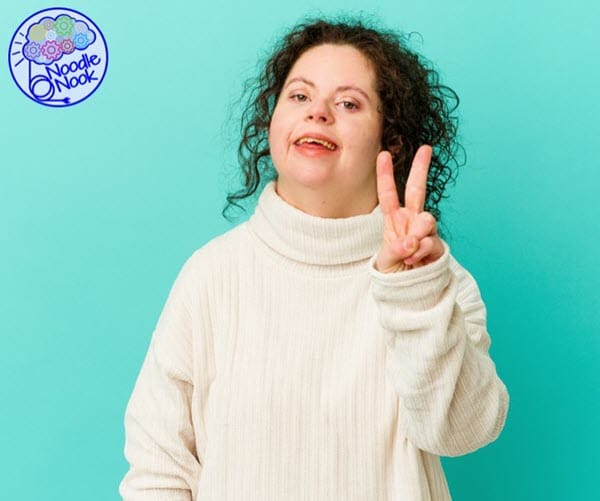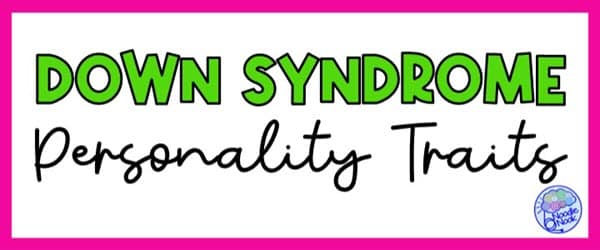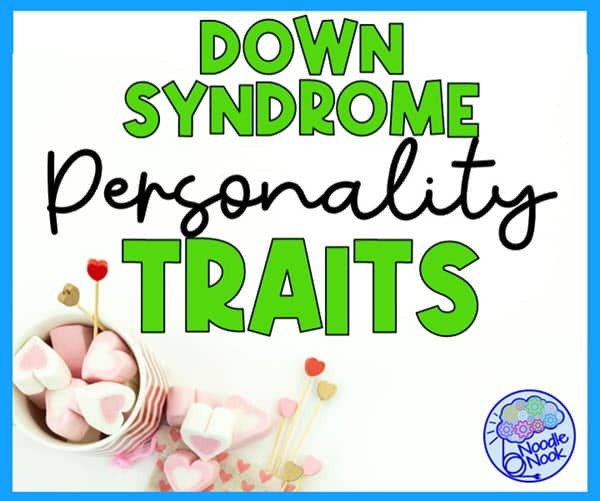For people with an extra chromosome, there are several traits that are more likely to occur. The most important thing to remember is that not every person with that same extra chromosome is exactly the same. Yes, there are some general Down syndrome personality traits, physical differences, and cognitive differences. Again, individuals with Down syndrome are individuals and share many of the same personality traits as everyone else. So let’s explore the various personality traits commonly seen in individuals with Down syndrome, and provide tips on how to support their emotional and cognitive well-being.
What is Down Syndrome?
Down syndrome is a genetic disorder that results from the presence of an extra copy of chromosome 21 in a person’s cells. This additional genetic material disrupts the normal course of human development and can cause a wide range of physical and intellectual differences. It’s one of the most common chromosomal conditions in America, but it’s important to note that it’s not a disease or illness.
People with Down syndrome are individuals with unique personalities, strengths, and challenges, just like anyone else. It’s important for teachers to understand this, as they play an important role in providing education, support, and encouragement to children with Down syndrome.
By taking time to learn about this condition, teachers can help create a more inclusive and accepting environment that celebrates the unique qualities of individuals with Down syndrome.
Diagnosing Down Syndrome
There are different ways to diagnose and identify individuals with Down syndrome. Expectant parents can undergo prenatal tests, such as screening tests and diagnostic tests, to identify any developmental disabilities or health problems.
Screening tests, including maternal age, can indicate if there is an increased chance of Down syndrome.
Diagnostic tests, such as chorionic villus sampling or amniocentesis, can confirm the diagnosis of Down syndrome in a fetus.
Young children can also be identified through physical examination and developmental milestones, as well as blood tests to look for extra genetic material from the extra 21st chromosome.
Individuals with Down syndrome may have significant differences in early development, and may require additional support and intervention. It’s important for healthcare professionals and parents of children with Down syndrome to be aware of potential health problems, such as congenital heart defects and atlantoaxial instability, which can lead to medical problems in older children and adults.
It’s worth noting that there are three types of Down syndrome: Trisomy 21, Translocation Down syndrome, and Mosaicism. Also, while there is a higher chance of Down syndrome with increasing maternal age, most cases of Down syndrome occur in younger women. People with Down syndrome are also more likely to develop Alzheimer’s disease and have a higher chance of having heart conditions.

The National Down Syndrome Society and the Global Down Syndrome Foundation are support groups that provide information and resources for individuals with Down syndrome and their families.
If you’re a teacher and want to learn more about how to support individuals with Down syndrome in the classroom, check out this free course through the TxCAN Network.
General Personality Traits
General personality traits are often related to individuals with Down syndrome due to their extra chromosome, which can impact physical and cognitive development. This genetic condition can lead to characteristic physical features, such as small stature, small ears, and a short neck. It can also result in developmental delays and intellectual disability, affecting cognitive and communication skills.
These differences in physical and cognitive development can impact personality traits, including social interaction, behavior, and emotional expression. While not every person with Down syndrome will display the same personality traits, understanding these differences can be helpful. This is especially true for teachers, parents, and healthcare professionals so they can support and celebrate the unique qualities of individuals with Down syndrome.
Some general personality traits common in individuals with Down syndrome include:
- Affectionate and social behavior: People with Down syndrome tend to be very friendly and enjoy social interaction with others.
- Decreased muscle tone: Also known as hypotonia, this can cause low muscle tone and affect physical development.
- Intellectual disability: Many people with Down syndrome have some degree of intellectual disability, which may affect language development and cognitive abilities.
- Developmental delays: Individuals with Down syndrome may experience developmental delays in achieving their milestones, such as crawling, walking, or talking.
- Behavioral issues: Some individuals with Down syndrome may experience behavioral problems, such as impulsivity or stubbornness, that require extra help and support.
- Unique physical features: People with Down syndrome may have certain physical features that are unique to the condition, such as a small stature, short neck, small hands and feet, and a single crease across the palm of the hand.
Cognitive and Behavioral Traits
Individuals with Down syndrome may experience cognitive and behavioral traits that can have an impact on their lives. Cognitive traits are related to a person’s thinking and learning abilities. Individuals with Down syndrome may experience varying degrees of intellectual disability that can affect their ability to learn and understand information.

- Intellectual disability: As mentioned earlier, many people with Down syndrome experience some degree of intellectual disability, which can affect their ability to learn and understand information.
- Language development: Individuals with Down syndrome may have delayed language development or difficulty with communication skills.
- Short-term memory: People with Down syndrome may have difficulty with short-term memory, which can affect their ability to learn new information.
- Motor skills: Hypotonia, or low muscle tone, can affect a person’s ability to develop motor skills such as walking, running, or jumping.
- Behavioral issues: Some individuals with Down syndrome may experience behavioral problems such as impulsivity, stubbornness, or anxiety, which may require additional support and intervention.
In terms of behavioral traits, individuals with Down syndrome may display specific behaviors. That includes impulsive or obsessive behaviors, difficulty with social interaction, and challenges with communication. These traits may manifest differently from person to person and may require individualized support and interventions.
Individuals with Down syndrome may display unique cognitive and behavioral traits that can affect their learning and socialization. While these traits can vary from person to person, identifying and addressing them through appropriate support and intervention can greatly improve the individual’s quality of life.
Emotional Traits
People with Down syndrome may have unique emotional traits that can affect their behavior, socialization, and overall well-being. While individuals with Down syndrome may experience a range of emotions similar to those in the general population, they may also have difficulty expressing, regulating, and understanding their emotions.
As a result, they may exhibit behaviors that can be difficult to understand, such as meltdowns, social withdrawal, or difficulty adapting to new situations. Recognizing and addressing these emotional challenges can help you as you support individuals with Down syndrome to be more successful.
- Emotion regulation: People with Down syndrome may experience difficulties regulating their emotions, which can lead to behavioral issues or mood swings.
- Increased risk for certain conditions: Individuals with Down syndrome have an increased risk for certain medical conditions, such as celiac disease, obstructive sleep apnea, and congenital heart defects, which may affect their emotional well-being.
- Social skills and behavior: Some individuals with Down syndrome may experience difficulty with social skills and behavior, which can impact their relationships with others and require additional support and intervention.
How to Support These Traits in the Classroom
Here are some tips to help support students with Down syndrome in the classroom based on the emotional traits they may display:
- Create a safe and supportive classroom environment that promotes positive social interactions and relationships.
- Use visual aids such as pictures, diagrams, and videos to help students understand complex concepts.
- Establish a daily routine and structure to help students feel more secure and organized.
- Provide clear and concise instructions, and allow extra time for processing and responding to directions.
- Encourage self-expression through activities like art, music, and drama to help students express their emotions in a healthy way.
- Practice mindfulness and relaxation techniques to help students regulate their emotions and manage stress.
- Be aware of individual triggers for anxiety and stress and develop strategies to minimize or avoid them.
- Provide opportunities for peer support and mentoring to promote positive social interactions and friendships.
- Encourage open communication with parents and caregivers to ensure a collaborative approach to support the student’s emotional well-being.
- Recognize and celebrate individual strengths and accomplishments to build self-esteem and confidence.
Looking to learn more? Try these posts: 5 Best Math Differentiation Strategies; Positive Self-Talk in the Classroom; Breaking the Chain of Bad Behavior
Positive Traits and Strengths
Individuals with Down syndrome are often characterized by their positive traits and strengths that make them unique. These traits can include an innate kindness and generosity, an eagerness to please others, a strong sense of humor, and a natural ability to connect with others.
Individuals with Down syndrome can also have an exceptional memory, a love for music and dance, and a great attention to detail. These strengths can make them valuable contributors to society, and it’s important to recognize and appreciate them.
- Kindness, empathy, and determination: People with Down syndrome are often known for their kind and empathetic nature. They show genuine care and concern for others and are willing to help whenever needed. Additionally, they are determined and persistent in pursuing their goals, even in the face of challenges.
- Resilience: Many individuals with Down syndrome exhibit remarkable resilience in the face of adversity, bouncing back from setbacks and challenges with a positive attitude.
- Sociability: People with Down syndrome often enjoy socializing and connecting with others, and may have an outgoing and friendly personality.
- Creativity: Some individuals with Down syndrome have a strong creative streak, whether it be in art, music, or other forms of expression.
- Perseverance: Despite the challenges they may face, many individuals with Down syndrome demonstrate a remarkable level of perseverance, working hard to overcome obstacles and achieve their goals.
- Positive attitude: Individuals with Down syndrome often have a positive outlook on life, and can be a source of inspiration and encouragement to those around them.
- Sense of humor: People with Down syndrome often have a great sense of humor and love to make others laugh. They are quick to find joy in everyday situations and can bring positivity to those around them.
- Connection with others: Individuals with Down syndrome often have an uncanny ability to connect with others, forming deep and meaningful relationships. They can easily read and understand social cues, making them great communicators and friends.
- Memory and attention to detail: Many people with Down syndrome have excellent memory and attention to detail, making them well-suited for jobs that require these skills. They can excel in various careers, including administration, data entry, and customer service.
Individuals with Down syndrome face many challenges, but they also possess incredible strengths and unique qualities. It’s important to recognize and celebrate the positive personality traits and strengths that individuals they possess. Just like with any child, focus in on their strengths and work to encourage them to achieve great things.
RECAP: Down Syndrome Personality Traits
Let’s celebrate the unique qualities of individuals with Down syndrome by recognizing their common personality traits! From cognitive and behavioral traits to emotional traits and positive strengths, individuals with Down syndrome have a lot to offer. By providing appropriate support and intervention, they can reach their full potential and thrive in various aspects of their lives.
So, let’s join hands and educate ourselves about Down syndrome and work together to provide the best possible care and support for individuals with Down syndrome. I invite you to take a free course with me on the TxCAN network website to learn more about how you can help. With the right resources and support, individuals with Down syndrome can lead fulfilling lives and make valuable contributions to their communities.
Let’s make a difference together!




